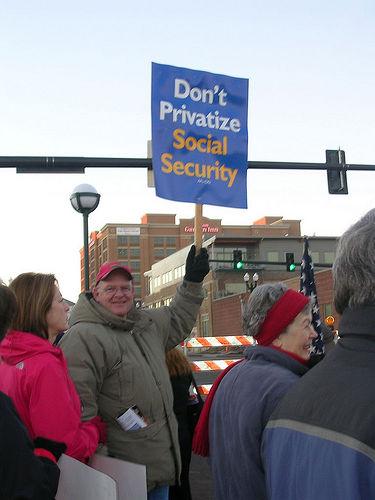For the 35 million retired workers among them, this 3.6 percent cost of living adjustment will amount to an average increase of about $50 per month, or $600 per year.
Of course, in real terms that’s not a raise at all. All it does is help people catch up with rising prices. But it helps.

Make Social Security a flat tax on all wages instead of a regressive tax on low and medium wages, says Salvatore Babones. Photo by sagesnow.
A legacy of the Great Depression, Social Security put an end to the widespread poverty of America’s retired workers. For more than 70 years, we have provided a secure retirement income to people who spent their lives building our country. Support for retired workers is the single largest category of Social Security benefits, accounting for over 63 percent of all cash benefits paid in 2010.
Some people think of Social Security as a personal pension or insurance policy. It’s not. The Social Security budget is what we spend every year to make sure that elderly and disabled Americans and their dependents can live with dignity. On that score, it’s money well spent.
Between 1935 and 1973, average Social Security payments rose steadily. Company pensions rose along with them. By 1973, the average monthly benefit for a retired worker was $1,218, adjusted for inflation to 2010 dollars. That’s wasn’t a fortune, but it was enough to live on, especially if you had a private pension to boot.
Today, those private pensions are vanishing. An increasing number of Americans, now more than one-third, are retiring on Social Security alone — if they retire at all. Among Americans ages 65 to 69, 36 percent of men and 26 percent of women continue to work.
Considering these trends, it’s a good thing that average Social Security benefits have risen since 1973. The average monthly benefit for a retired worker is now $1,391. That’s a whopping $173 raise over a 37-year period.
News flash: It’s 2011. The 21st century. Shouldn’t people be retiring better now than they were in 1973?
All told, Social Security benefits for retired workers increased on average less than 0.5 percent per year over the past 37 years, adjusted for inflation. In that same period, increases in national income per person in America (gross domestic product per capita) averaged 1.7 percent per year.
Seen in that light, Social Security benefits just haven’t kept up.
Lots of Washington policy people are talking about reducing the rate of growth in Social Security benefits. They think a 3.6 percent cost of living adjustment in one year is too much. They’re wrong.
If Social Security benefits for retired workers had kept up with gross domestic product growth since 1973, the average benefit would now be $2,244 a month. That comes to just less than $27,000 a year. Next year’s cost of living adjustment gets us nowhere near that level.
Even after next year’s increase, the average benefit for a retired worker will be less than $18,000 per year. Technically, that’s enough to keep them out of poverty. But let’s face it. Who wants to retire on less than $18,000 a year?
Right now we’re in a recession, and budgets are tight. But the real purchasing power of Social Security retirement benefits — adjusted for inflation — has hardly budged since 1973. Retirees deserve more than just a cost of living increase. They deserve to live better than they did in 1973.
Can we afford an increase? Sure. All we have to do is equalize the Social Security tax rate for everyone.
In 2012, American workers will pay Social Security taxes on their first $110,100 of wages. For most Americans, that’s all of their wages. Only a lucky 10 percent of Americans make more.
Let that lucky 10 percent pay Social Security taxes on all of their wages, just like the rest of us do. Make Social Security a flat tax on all wages instead of a regressive tax on low and medium wages.
A flat Social Security tax would generate over $100 billion more every year than the current regressive tax. In a time of high debt and budget deficits, that’s money the government could desperately use. It’s money that retirees could use even more.
No one wants to pay taxes. But when we have to choose between a tax break for those making over $110,100 per year or a benefits increase for those receiving less than $18,000 per year, the choice is clear. It’s time to make Social Security a flat tax.
